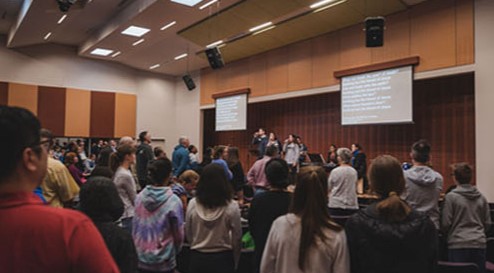AUDIO RECORDING

RESOURCES
WRITTEN TRANSCRIPT
Feeling dismayed
Perhaps like me you have been dismayed this week by the handling of the ‘so-called Religious Discrimination Bill’ and particularly by the media coverage of the debate. The primary purpose of such a bill, to prevent people from being harassed or discriminated against on the basis of their religious beliefs and to give effect in anti-discrimination law to Article 18 of the International Covenant on Civil and Political Rights [see below] to which Australia is a signatory, seems to have been lost sight of amidst concern for the rights of gay and transgender students. The failure to reach a consensus brings home not just the complexity of supporting all students but also the divided nature of Australian public life and the determination of the Gay and Transgender lobby to settle for nothing other than a full acceptance and affirmation of students’ choices about sexuality and gender [cf. Steve McAlpine’s article].
The primary purpose of such a bill, to prevent people from being harassed or discriminated against on the basis of their religious beliefs... seems to have been lost sight of amidst concern for the rights of gay and transgender students.
The reluctance to allow religious institutions to maintain their ethos by prioritizing the employment of those who support their beliefs and mission and refusing to employ those who are in active disagreement with their beliefs, particularly in the area of sexuality and gender, and the hostility to protecting statements of belief for fear they may offend some, is disturbing and to me at least, a source of grief. Grief because there seems to be a willingness to compromise on freedom of association and freedom of speech, freedoms fundamental to a working democracy. Grief because in its insistence on affirmation only of trans young people I fear harm will be done to many [cf Al Stewart’s review of Abigail Shrier’s book]. Grief at the distortion of truth in our public debate as we hear the attitudes and actions of Christians misrepresented. Grief because Christians being Christians is good for society as a whole, a contribution to be welcomed and not frustrated.
How do we respond?
How should we respond to what we see happening, and to the prospect of Religious Discrimination becoming part of this year’s Federal election campaign?
I think there are six [at least] parts to our response.
1. We remember that our God is almighty, the sovereign ruler over history. He raises up rulers, and He brings them down [Is. 40:21-24; Luke 1:50-53]. Even those who don’t acknowledge Him serve His purpose, whether it is Pharoah [Ex. 9:15-16] , or the Assyrians [Isaiah 10:5-15], or a Pilate [Acts 4:27-28]. He has a plan and purpose to subject all things to Christ and reveal Him as Lord of all [Phil. 2:9-11, Revelation], and all history and all the affairs of nations work towards that end. He is never off the job [Psalm 121] and His people matter to Him [Psalm 116:15, Is. 40:11], and He has promised to work all things for the good of those who love Him, the good of their conformity to the image of His Son [Romans 8:28-30]. Believers do not need to fear.
2. Knowing our God is sovereign we do as He has commanded, we pray for those in authority ‘so that we may lead a tranquil and quiet life in all godliness and dignity’ [1 Tim. 2:2]. We should pray that they would fulfil God’s purpose for those in human authority, the rewarding of the good and the punishment of the wicked [Romans 13:1-7], and we should pray that the Lord would have mercy on them and bring them to confess that Jesus is their Lord, the one to whom they also can draw near for help in their difficult task.
3. We keep living as Christians, not repaying evil for evil, giving careful thought to doing what is honourable in everyone’s eyes [Rom. 12:17], which must surely include providing care for young people troubled about their identity, slandering no-one, avoiding fighting, being kind and always showing gentleness to all [Titus 3:1-2].
4. We seek gospel opportunity, there is surely opportunity here for what we have is an open clash of worldviews. For example, if asked about why it is important that we can bring up our children in a context where Christian truth is taught and modelled we are being invited to talk about God, about His reality and goodness of which we have conviction because of Jesus. There are opportunities to talk about why we believe certain things are right and others wrong, which is again an opportunity to talk about whether there is a God who reveals His good will and who judges, or not. We can say the issue is not whether we love gender confused young people, but how do we know how best to love them. We can talk about whether meaning and purpose are found by looking within, or turning out to the God who is. The aim is not to win an argument but to talk about the gospel, to share the light, life and hope that is found in Jesus for the sinful and confused.
The aim is not to win an argument but to talk about the gospel, to share the light, life and hope that is found in Jesus for the sinful and confused.
5. Parents will need to own their responsibility to actively and explicitly teach their children to do all that Jesus has commanded, including Scriptures’ distinctive teaching on sexual morality and gender, to teach it as good and life affirming, and to counter the lie of the world that freedom is found in sexual freedom. And we will all, as a congregation, need to support and encourage each other in this.
6. We need to remember that part of ‘seeking the peace of the city’ [Jeremiah 29:7] in a democracy is to love our neighbours by participating, as we are able, in the democratic process, whether that is by making respectful representations to our parliamentarians by letter or in person, or being involved in other ways. [If you are not sure where to start with this, click HERE for a sample letter from Neil to a MP]
Freedom to express our faith and freedom to bring up our children in the faith should have bipartisan support and not become a party political issue. Let us pray that it does not become so during the election campaign, with all the potential for rancour and misrepresentation that would bring. And if it does, let’s remember that God calls us, as far as it depends on us, to live at peace with all, and that our goal is not power but to honour the Lord Jesus by living faithful to Him who, when abused by the political jostling for power that perceived Him as a threat, left His vindication to God. [1 Peter 2:21-24, 4:24]
Let’s remember that God calls us, as far as it depends on us, to live at peace with all, and that our goal is not power but to honour the Lord Jesus by living faithful to Him
Article 18 of the International Covenant on Civil and Political Rights
- Everyone shall have the right to freedom of thought, conscience and religion. This right shall include freedom to have or to adopt a religion or belief of his choice, and freedom, either individually or in community with others and in public or private, to manifest his religion or belief in worship, observance, practice and teaching.
- No one shall be subject to coercion which would impair his freedom to have or to adopt a religion or belief of his choice.
- Freedom to manifest one's religion or beliefs may be subject only to such limitations as are prescribed by law and are necessary to protect public safety, order, health, or morals or the fundamental rights and freedoms of others.
- The States Parties to the present Covenant undertake to have respect for the liberty of parents and, when applicable, legal guardians to ensure the religious and moral education of their children in conformity with their own convictions.
RECENT POSTS





